- Home
- Technical Cooperation Projects
- Index of Countries
- Asia
- Mongolia
- Project for Promoting Employment of Persons with Disabilities (DPUB2)
- Project News
- Promoting Job Coach System linking persons with disabilities and companies to Mongolia. <third>
Project news
2023-07-05
Promoting Job Coach System linking persons with disabilities and companies to Mongolia. <third>
Deepening one’s learning and develop an action plan upon returning home
In February of this year, Mongolian government officials, NGOs, and private-sector workers engaged in providing employment support for persons with disabilities visited Japan to learn about Japan’s employment system for persons with disabilities in Osaka. Following the previous two articles (1) and (2), we would like to introduce the situation.
Complex and multi-layered Japanese support system
“Japan Organisation for Employment of the Elderly, Persons with Disabilities and Job Seekers, commonly known as JEED, is a specialist organisation that provides employment support for job seekers, including persons with disabilities”. “It is responsible for implementing the Act on Promotion of Employment of Persons with Disabilities, which is designed to promote the employment of persons with disabilities. The funding for this initiative comes from the Persons with Disabilities Employment Levy”.
The voice of Dr Hisao Chiba, DPUB2 Chief Advisor, echoed in the conference room of JICA Kansai Center in Kobe City. On this day, which was scheduled for group discussions and reflections to deepen the participants’ learning based on three days of lectures and site visits, Dr Chiba started the day by providing an explanation about the support organizations in Japan related to employment of persons with disabilities. The purpose was to review and enhance the participants’ understanding of the establishment and roles of each organisation involved in supporting employment of persons with disabilities before they engaged in their assigned tasks.
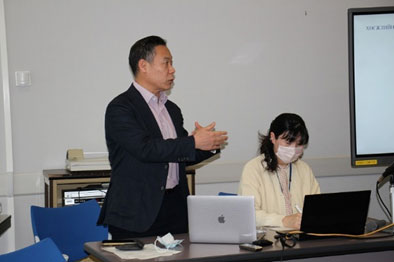 Dr Hisao Chiba (left), DPUB 2 Chief Advisor, explains about the support system for the employment of persons with disabilities in Japan.
Dr Hisao Chiba (left), DPUB 2 Chief Advisor, explains about the support system for the employment of persons with disabilities in Japan.
Furthermore, Dr Chiba explained in detail about the complex support system in Japan, stating, “One of the sub-organisations established by the government in each prefecture under JEED is the Local Vocational Centres for Persons with Disabilities, which we learned about on the third day. There are 52 such centers nationwide”. He continued, “The Osaka City Vocational Rehabilitation Centre, which we heard about on the first day, operates with grants from JEED and the Ministry of Health, Labour and Welfare”. He further added, “To provide support that is closely tailored to local communities, Employment and Living Support Centres for Persons with Disabilities have been established in 334 locations nationwide”. Dr Chiba also mentioned, “There are over 12,000 businesses like Kashima Yuaikai that provide employment transition support and ongoing assistance, actively engaging with the local community”.
Discussions on post-return initiatives in four groups
The training participants then discussed their post-return activity plans in four groups: 1) payments, 2) enterprise awareness, 3) job coaching and employment support systems, and 4) improving the commissioning system.
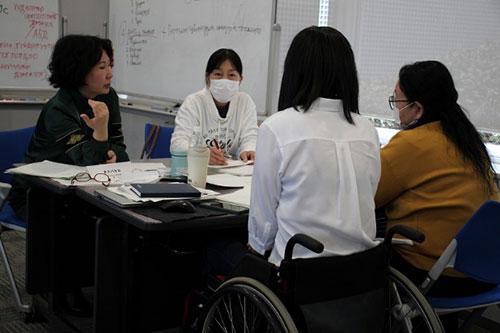 Training participants discussing enthusiastically in groups.
Training participants discussing enthusiastically in groups.
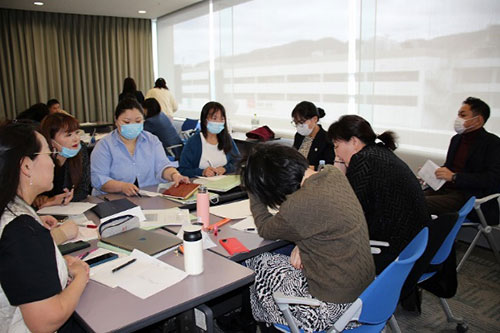 Some were seen thinking seriously with their heads in their hands.
Some were seen thinking seriously with their heads in their hands.
During the group discussion, Mr Saiki actively participated. For example, when addressing the (2) enterprise awareness group, he raised the question, “First, let’s think about what industries in Mongolia could promote employment of persons with disabilities”. His advice prompted the members to engage in discussion. When asked by a group member, “What should be the first focus in awareness-raising efforts?” Mr Saiki pointed out, “Awareness-raising activities cannot be successful without companies that actually hire persons with disabilities. It is crucial for companies to share their positive experiences of employing persons with disabilities”. He further suggested, “Collaboration between the government and the private sector in promoting awareness might be more effective. In Malaysia, for instance, the government partnered with major retailers to develop hiring plans for persons with disabilities and successfully spread employment initiatives nationwide, creating a network among companies and further expanding the reach of awareness campaigns”.
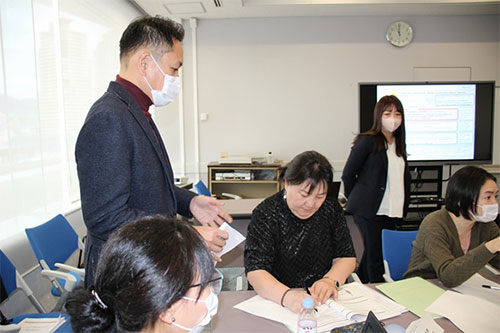 Mr Daisuke Sakai (left) facilitates discussions and answers questions as he rotates through the four groups.
Mr Daisuke Sakai (left) facilitates discussions and answers questions as he rotates through the four groups.
Regarding the (3) job coaching and employment support systems group, Mr Saiki addressed the participants, saying, “When working with persons with disabilities, it is important to focus not on what they cannot do or their challenges, but rather to emphasize what they can do and connect their strengths with suitable jobs”. He further explained, “In the case of persons with intellectual or mental disabilities, there is a tendency for their employment to be affected by any troubles they may face in their daily lives, and conversely, their daily lives may be disrupted if their employment is not going well. Therefore, it is necessary to provide follow-up support to ensure stability in both areas”. In addition, He highlighted the need for job coaches to be aware of and address changes in the workplace, such as changes in colleagues or machinery, as there are constant dynamics at play. He stated, “Job coaches play a vital role in recognizing and assisting individuals who may have a difficulty adapting to such changes, ensuring they can effectively cope with workplace transitions”.
When asked if there are any examples in Japan of companies working together to create special subsidiary companies, he replied: “Large companies are not allowed to create special subsidiary companies together with other companies under the system because of the requirement for consolidated accounts, but many small and medium-sized companies find it difficult to employ persons with disabilities on their own. They therefore set up cooperatives in the region and employ persons with disabilities by sharing the workload of each company, counting them working there as part of the number of employees”.
In addition, when asked, “In Japan, do job coaches need to renew or participate in follow-up training once they have completed their initial training and received a certification?” Mr Sakai responded, “In Japan, there is currently an ongoing discussion regarding this matter, and the necessity of advanced training for experienced job coaches is also being considered”.
Circulation arising from the creation of manuals
The four groups continued their discussions after lunch, using their full time limit to develop an action plan for their post-return activities. It was just after 3pm, some five hours into the discussion, when representatives from each group took it in turn to present in front of everyone.
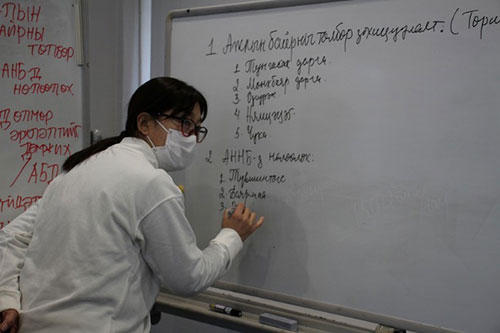 Presentations were given using a variety of methods, including whiteboards and PowerPoint.
Presentations were given using a variety of methods, including whiteboards and PowerPoint.
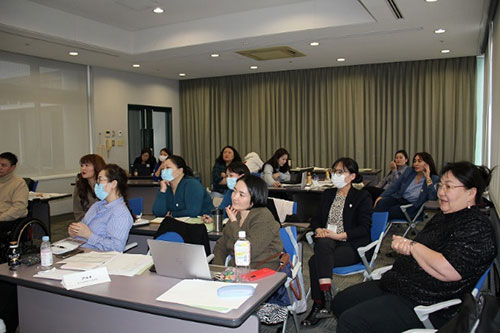 Training participants listening to presentations by other groups
Training participants listening to presentations by other groups
In presentations, there were various suggestions put forward, such as the idea of involving not only private companies but also researchers from social welfare universities in the promotion and awareness of the job coach system. There was also an observation that it is necessary to establish legal regulations regarding job coaching. Additionally, there was a proposal to establish a specialized implementing organization called “Job coach Network Mongolia” to provide support for job coaching activities and employment transition assistance.
Some groups suggested that three model companies should be selected from among small and medium-sized enterprises in the service and production sectors and assessed to see if they are ready to employ persons with disabilities, and then promote the employment of persons with disabilities; others suggested publicising good practices, including Japanese and Malaysian companies that employ a large number of persons with disabilities and meet the legal employment rate, holding events to raise awareness of the statutory employment rate and providing incentives for companies that have achieved it.
After the presentations of the four groups were concluded, Dr Chiba addressed everyone, saying, “Thank you for your hard work over the training period. I fully support each proposal”. Following these words of encouragement, He made a suggestion, “Why don’t we start working on creating a manual moving forward?” There was a reason behind Dr Chiba’s proposal. In Mongolia, there is a system in place where companies that meet the statutory employment rate can receive incentives such as bonuses, tax reductions, and exemptions. However, in reality, this system is scarcely utilized due to reasons such as lack of awareness among companies or difficulty in understanding the application process. Instead of unilaterally urging companies to pay fines, it goes without saying that conveying the benefits of incentive programs and employment support services, such as bonuses, tax reductions, and exemptions, would be more effective in gaining the attention of companies. With an easily understandable manual, job coaches can visit companies and simultaneously communicate the benefits and responsibilities, thereby facilitating the understanding and persuasion within the company. Nevertheless, companies that fail to advance disability employment will be required to pay fines to the government.
The training participants nodded their heads in agreement as Dr Chiba explained that “by creating a manual, we can expect a smooth circulation from job coaches to enterprises, and from enterprises to the government”.
Sense of achievement from each perspective
The expressions on the participants’ faces after the training were full of satisfaction and fulfilment, showing that they had gained a firm awareness and stimulus from their respective positions and had grasped the response.
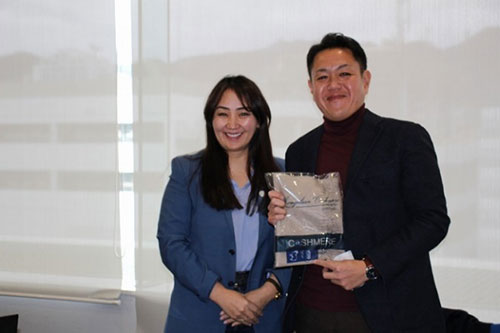 Ms Tungalagtamir (left) smiling with Mr Sakai
Ms Tungalagtamir (left) smiling with Mr Sakai
Ms Tungalagtamir, Director of the Population Development Policy Implementation Coordination Department of the Ministry of Labour and Social Protection, reflected on the training and remarked, “It was a highly educational training, and I was particularly impressed by the concept of special subsidiary companies, which do not exist in Mongolia yet. It was fascinating to learn about this completely unfamiliar information. Additionally, I believe that the activities of vocational rehabilitation centers operated by the government have great potential in Mongolian society”, she said.
In addition, Ms Tungalagtamir mentioned that Japan had provided employment support for persons with disabilities to Malaysia ahead of Mongolia. She expressed her determination: “Based on the long history of cooperation between Japan and Malaysia, and taking into account the lessons learned in Malaysia, I would like to introduce and promote the job coaching system in Mongolian society in an appropriate manner”.
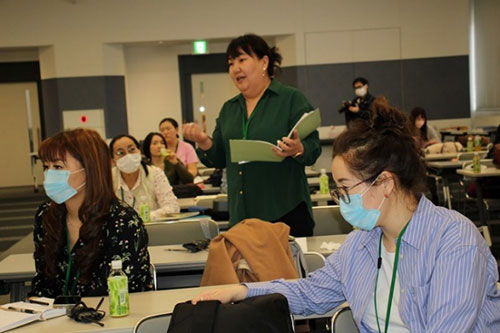 Ms Altangerel (center), adviser to the Autism Association of Mongolia and job coach trainer.
Ms Altangerel (center), adviser to the Autism Association of Mongolia and job coach trainer.
Ms Altangerel, an advisor to the Autism Association of Mongolia, said, “Generally, persons with physical impairments have some ability to speak up and engage in activities regarding their rights, but for persons with intellectual disabilities, there are cognitive challenges that limit their opportunities for social participation in Mongolia”. Ms Altangerel, who also has a son with autism, expresses personal joy in the introduction and dissemination of the Job Coach system, which was launched in the United States to support employment of persons with intellectual and mental disabilities, saying, “Through the efforts of Job coaches, the employment and social participation of persons with intellectual and mental disabilities can be improved, which will ultimately enhance their quality of life”.
In Mongolia, it is planned to continue the implementation and dissemination of the Job coach system in a way that allows all persons with disabilities to benefit from the system. However, Ms Altangerel expresses the belief that “personally, there should be a particular focus on supporting persons with intellectual and mental disabilities”. Furthermore, as an advisor to the Autism Association of Mongolia, she reaffirms their commitment to not only collaborating with the Autism Association of Mongolia but also working closely with organizations such as the Down Syndrome Association of Mongolia and the Association of Parents with Disabled Children, with the aim of improving the lives and social status of persons with intellectual disabilities. Ms Altangerel believes that persons with intellectual disabilities are significant resources for society. She expressed the hope that the introduction of the Job Coach system would facilitate their social participation and provide them with a sense of contributing to society, stating, “I hope that through the implementation of the Job Coach system, they can gain a sense of fulfillment by realizing that they are making a valuable contribution to society”.
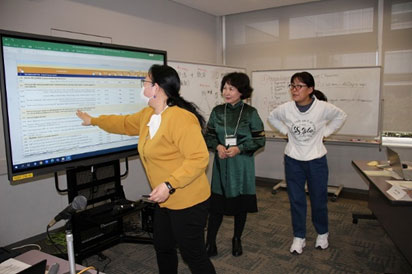 Ms Odbayar (centre) of Goldengobi group company presenting with members
Ms Odbayar (centre) of Goldengobi group company presenting with members
Ms Odbayar, who works in human resources at Goldengobi group company, a leading tourism, trading and construction company in Mongolia, also attended a DPUB2 corporate awareness seminar in Ulaanbaatar last September.
Ms Odbayar explained the reason for participating in this training in Japan, saying, “In Mongolia, as the momentum for the enactment of laws regarding the employment of persons with disabilities grows and companies are increasingly expected to fulfill their social responsibilities, as a human resources professional, I have the desire to actively hire persons with disabilities. However, even when we do hire them, it has been challenging to ensure their long-term retention. After attending a seminar last autumn, I realized that I lacked an understanding of proper methods, which is why I decided to participate in this training”.
The company plans to employ eight persons with disabilities this year. “I would like to build a network in cooperation with the people I met through this training course, so that we can properly employ persons with disabilities. I am also very interested in the system of special subsidiary companies, so when I return to Mongolia, I will look into the legal environment for creating a special subsidiary company”, Ms Odbayar said enthusiastically.
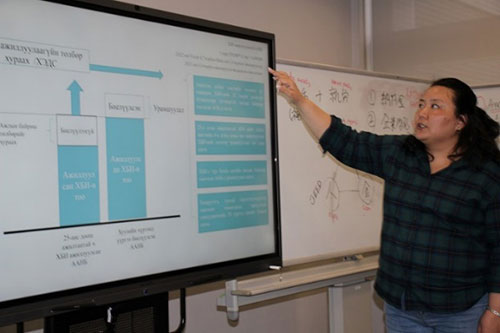 Ms Mönkhbayar from Ulaanbaatar City Council presenting on the role of government discussed in the group.
Ms Mönkhbayar from Ulaanbaatar City Council presenting on the role of government discussed in the group.
Meanwhile, Ms Mönkhbayar, the director of Department of Labour and Social Welfare, Ulaanbaatar City Council, where half of Mongolia’s total population is concentrated, expressed her views by saying, “In Mongolia, we do have a similar system to that of Osaka Prefecture. However, there is still a lack of awareness and a sense of management from the government’s side in terms of understanding and implementing the system. As a result, the system is not functioning effectively, and we feel that adequate services are not being provided”. She further stated, “I particularly admired the active collaboration between Osaka Prefecture, private companies, and NGOs, as well as the progress in outsourcing services. In Mongolia, including our administration, there is still a lack of understanding regarding disability employment. Therefore, after returning home, I would like to continue collaborating with the participants of this training and start by implementing training programs to promote disability awareness in the nine districts of Ulaanbaatar city”.
After their productive stay in Osaka, ten participants and carers from government officials, companies and NGOs returned to Mongolia. However, eight remained in Japan for a further week. These eight individuals are members actively involved in disability support organizations and the General Authority for the Development of Persons with Disabilities, and they are expected to play a role in training job coaches in Mongolia in the future. They moved to Tokyo and, together with Japanese trainers, learned about key points to consider when conducting job coach training and the operational methods for conducting such training. After acquiring this knowledge, they returned to Mongolia.
A similar training programme is scheduled for September 2023. The Mongolian job coach system is now in full swing, with the hopes of people from both Japan and Mongolia, and what kind of examples of employment of persons with disabilities will emerge from it, and how Mongolian society will change. The crucial moment is just around the corner.
- About JICA
- News & Features
- Countries & Regions
- Our Work
- Thematic Issues
- Types of Assistance
- Partnerships with Other Development Partners
- Climate Change / Environmental and Social Considerations
- Evaluations
- Compliance and Anti-corruption
- Science and Technology Cooperation on Global Issues
- Research
- JICA Development Studies Program / JICA Chair
- Support for the Acceptance of Foreign HRs / Multicultural and Inclusive Community
- Publications
- Investor Relations
